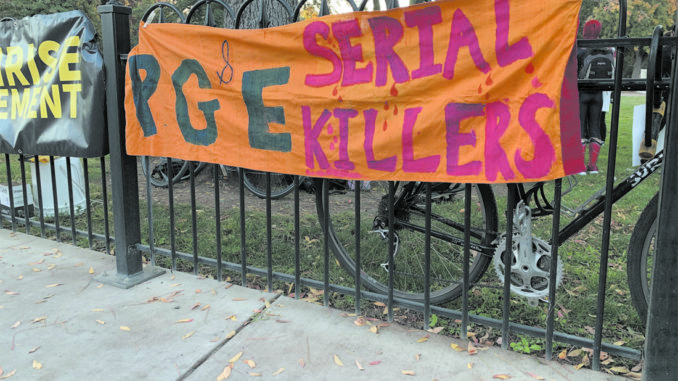
Michael Hanko leaned over the lectern in a Chico courtroom as if his legs would give out, mustering the strength to continue speaking about the sibling he lost in the Camp Fire.
His was the last of the in-person victim impact statements directed at PG&E executives and the company’s attorneys during sentencing proceedings at Butte County Superior Court on June 18. The previous day, dozens of others stood in the same spot to bear witness to the pain, trauma, loss—and in many cases, raging anger—triggered by the death of a beloved family member in the mega blaze.
For PG&E and District Attorney Mike Ramsey, the day was the conclusion of a criminal investigation more than a year in the making. But for those who lost loved ones, it was yet another chapter in the anguishing and seemingly never-ending saga wrought by the fire, the deadliest and most destructive in state history.
“I’m sorry, bro,” Hanko cried out, sobbing, before catching his breath and regaining his composure and physical stability.
Minutes earlier, Hanko, who also represented his three sisters, described the younger brother with whom he once shared a mobile home in Paradise. Dennis Hanko was an animal lover who “would not kill a bug. He would pick it up and put it outside.”
Turning his attention toward the utility—the corporation that days earlier pleaded guilty to 85 felonies, including 84 counts of involuntary manslaughter—Hanko made clear that the wounds stemming from the Nov. 8, 2018, tragedy remained fresh.
“I think there’s still an ember smoldering and the fire has not been put out. I don’t think the fire has been extinguished, but I hope today we are here to put it out,” he said.
What followed was Ramsey’s closing statement in the State of California for the County of Butte v. Pacific Gas & Electric Company. The longtime district attorney gave an overview of his office’s exhaustive investigation and the resulting 94-page report outlining the corporation’s culpability. It includes, among other things, evidence that the company had instituted salary incentives for meeting budgets that led to reductions in power line inspections.
One of the main findings in the narrative about the fire’s ignition is how the equipment that failed on that windy November day—a metal piece called a C-hook—was original hardware dating back to 1921. That is, it had been is use for 97 years.
“There’s more than sufficient evidence … that details PG&E’s criminally reckless and grossly negligent behavior for the purpose of elevating profits over safety that led to the deaths of those 84 people,” Ramsey said in the courtroom.
Indeed, on June 16, PG&E CEO Bill Johnson, who took the company’s helm after the fire and will leave upon completion of its bankruptcy agreement, read an apology and pleaded guilty on behalf of the utility to each of the 85 felony counts.
The same day, Ramsey released his report as a public document. It includes the names of each victim, as well as notations of where their remains were found. In some cases, if known, details about the end of their lives are denoted.
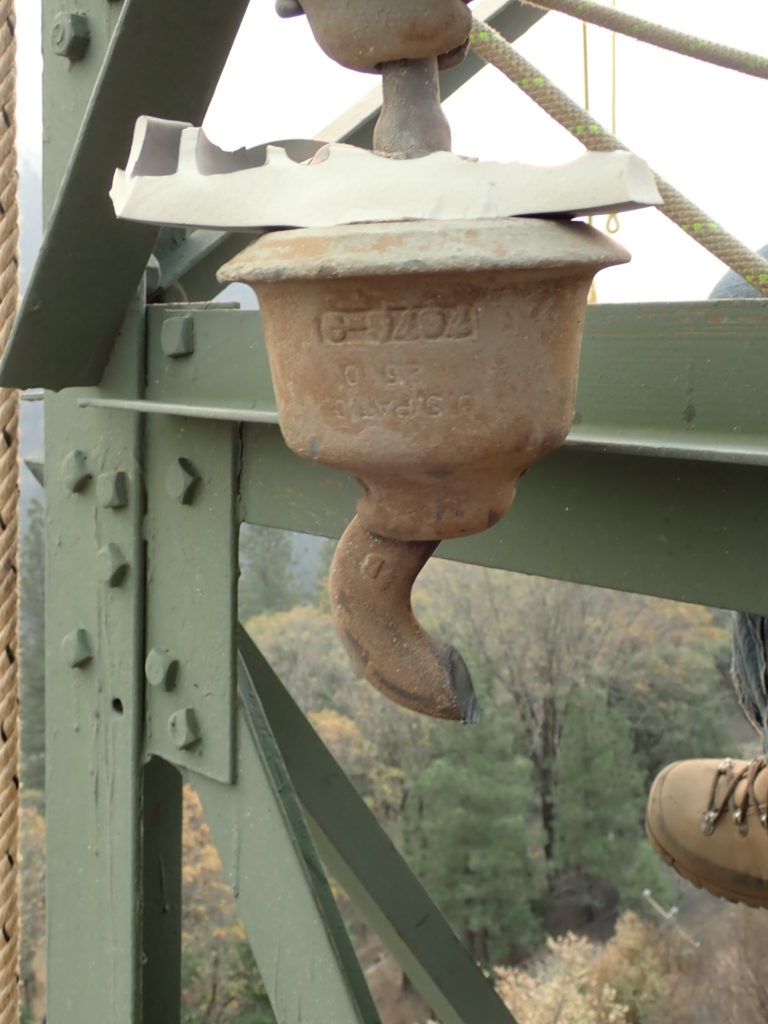
As if to drive the gravity of the horrific disaster home, Ramsey highlighted during his closing statements the deaths of Matilde, Christina and Ishka Heffern—grandmother, mother and daughter, respectively. Johnson wasn’t in the courtroom that day, nor was he present for any of the victim impact statements.
In a rare moment that cracked the veneer of Butte County’s generally unflappable top prosecutor, Ramsey described hearing the frantic last minutes of their lives. The women were trapped inside their home and called 911 as the fire bore down, he explained. On the other end of the line was a Cal Fire dispatcher, who tried to help them find a way out and listened helplessly as the three succumbed to the blaze.
“In 40 years of prosecution, I can truly say I’ve not heard a more god awful, terrible, disturbing tape-recording. It is truly scarring to the psyche and the soul. It can never be unheard,” Ramsey said, voice wavering.
The previous day, he read a statement written by Richard Heffern, son of Matilde, brother of Christina and uncle of 20-year-old Ishka, the youngest victim of the Camp Fire.
It was one of the many searing personal statements rebuking the energy provider’s executives, a few of whom sat quietly at a long table just feet away.
‘Focused on profits’
Among the many grieving family members who appeared in court, Laurie Teague was the first to take aim at PG&E’s greed. Speaking to the company’s interim CEO, Bill Smith, she painted a picture of her stepfather, Herbert Alderman, as a doting husband to her late mother. He’d played a crucial role raising her and her siblings, especially her younger brother Jim.
She noted that at 79, Alderman was “sharp as a tack,” though he didn’t drive and had mobility issues. In fact, he’d been receiving physical therapy and had sought help on the morning of the fire from his rehabilitation office. Someone was dispatched to pick him up, but was turned back at a roadblock.
Alderman never made it out, though that wasn’t clear at first. Teague was initially informed that he’d been marked safe. Her brother drove up from the Bay Area and searched the evacuation centers and parking lots, only to find out 12 days later that remains were found at Alderman’s home.
“My prevailing thought has been how absolutely terrified Herb must have been,” Teague said. “My heart aches for him.”
In terms of PG&E’s guilty pleas—which included one for unlawfully starting a fire—she noted the outcome doesn’t punish those responsible for the corner-cutting complacency that led to the disaster.
“It was not a corporation that made the decision over and over and over again to divert monies that should have been spent on equipment maintenance and vegetation control,” she noted. “Those decisions were made by people—people focused on profits, people who will never pay a price for the utter devastation of whole communities and the deaths of 84 people in the Camp Fire alone.”
DNA and grieving delayed
Teague said it took 336 days to officially identify Alderman’s remains. Others relate to that wait and the associated anguish of delayed closure.
During his victim impact statement, Chicoan Wally Sipher said his younger sister, 68-year-old Judy Sipher, was the 84th victim identified in the Camp Fire. He’d spoken with her the morning of the fire. They had lunch plans at Black Bear Diner, but Judy had flu-like symptoms and canceled. She wasn’t concerned about the blaze, hearing that it was in Pulga, roughly 10 miles east of Paradise.
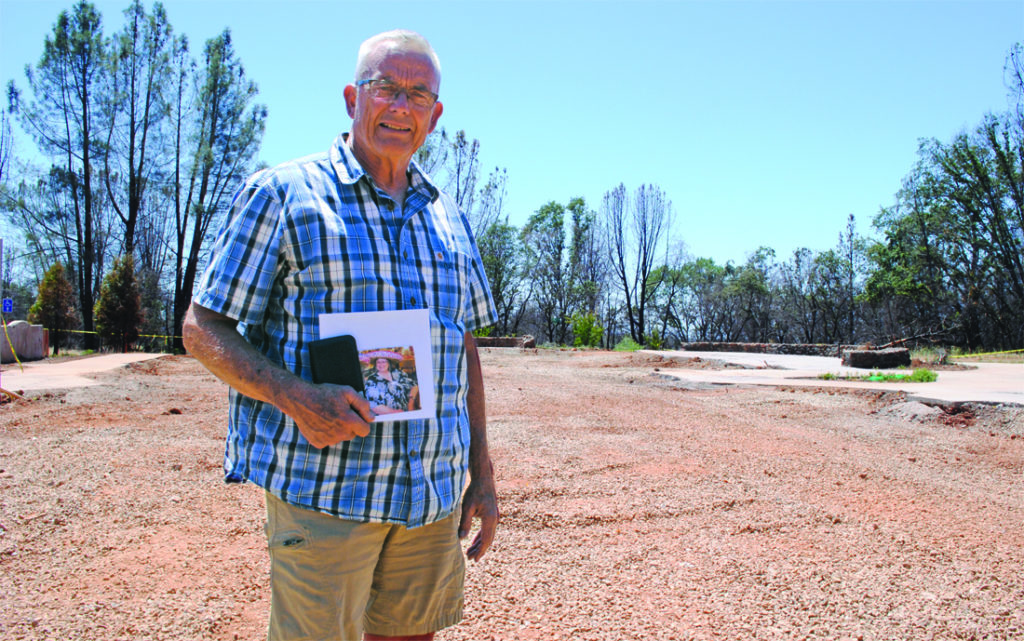
Sipher attempted to drive to Paradise to rescue her, but was blocked by the massive and chaotic evacuation of tens of thousands of Ridge residents. Hoping Judy had somehow made it off the Ridge, he searched every shelter and hospital in the region. It was days later that a sheriff’s deputy informed him that her apartment complex had been leveled.
“I knew with her condition—with the flu and she used a walker to get around—that she did not make it out,” he said.
The few remains recovered where her unit once stood were so degraded that identification ultimately came down to circumstantial evidence. That occurred in August, more than nine months after the fire.
Sacramento resident Meriel Wisotsky understands the frustration of that long process. She was among the first people to give DNA to help identify a loved one.
During the court proceedings, she described her 96-year-old mother, Paradise resident Ethel Riggs, as the heart of her family. Riggs was independent, still able to drive and cook, her daughter said.
“The only thing that was wrong with her is she was getting a little deaf and her knees were bad. That’s it. She was otherwise in great shape,” she said.
Wisotsky noted that she had to submit DNA twice for the ID process. “That’s when I moved to a new level of obsession and misery, because that brought it home to me how hot [the fire] must have been,” she said.
Eventually, when pathologists still couldn’t get enough DNA out of her mother’s remains to make a match, Wisotsky hired an attorney to issue a death certificate. Until that point, she couldn’t even get the TV in her mother’s name turned off.
Every part of the Camp Fire—from the news coverage to the identification process—made it impossible to grieve in the normal way, she said. But 19 months post-fire, PG&E’s pleas in the criminal case brought some comfort.
“While I too doubt the sincerity of the CEO yesterday, I felt better hearing him say, all those times, when each count was read, ‘Guilty, your honor.’ I found that cathartic,” she said. “Whether or not he really felt guilty was irrelevant to me. Hearing that said, ‘Yes, we are guilty, your honor,’ made a difference to me. So, I would like to thank you all for helping with this process.”
Everything lost
Angela Loo traveled from Oregon to speak about the loss of her father, Ernie Foss, and stepbrother Andrew Burt, who were among several people overtaken by the flames on Edgewood Lane, a rural street with a single entrance.
Loo described Foss, whom she referred to as “my Papa,” as a retired musician and computer guru who raised her as a single father. She was his eldest child and only daughter, and the two were extremely close.
Though quite eloquent, Loo repeatedly lamented that she couldn’t adequately convey the impact the Camp Fire has had on her life, beginning on the day of the blaze and continuing until this day. “There are no words to describe …” she repeated over and over.
“You can’t imagine the desperation as I called everyone I could think of to ask if any first responder could assist in their evacuation. Of course, all signals busy, no one answered, not even the fire station less than a mile from them.”
Loo spoke of the helplessness and the horror of seeing videos of the mass evacuation and more later of human remains belonging to her stepbrother. She felt guilty about not being there, having originally planned to visit her father a few days before the fire.
“I’ve lost my champion, the one who believed in me the most. He called me his wunderkind,” Loo said. “Daily, I mourn the loss of kinship and shared history.”
As her father’s home and all of its contents were destroyed, she has none of the precious mementos—recordings of Foss’ music, memorabilia and his instruments—commemorating his life.
Similar sentiments were shared by other victims’ family members.
Skye Sedwick said her father, John Sedwick, fought the fire at his home all day, only to perish when it returned for a second time to their Magalia neighborhood.
“As I mourned my father, I longed for a shred of clothing. Something that was his that I could hold, smell—and there was nothing,” Sedwick said.
Her father was not the stereotypical 82-year-old. He still worked 32 hours a week, she said, and planned to retire the month after the Camp Fire. Among his many engagements were teaching Sunday school, volunteering at the Gold Nugget Museum, and playing music on Saturdays at a senior center in Oroville—an unpaid gig he held for 20-plus years that has gone unfilled since his passing.
“My father was in the process of writing a book. He called it his legacy,” she said, pausing as her voice cracked. “He spent countless hours researching, reciting chapters to whoever would listen, and dictating the script into his computer. Every page of that book, the computer and the author perished that November day. His legacy up in smoke.”
Sedwick pointed out that her father spent years as a volunteer firefighter on the Ridge. Had he worked for PG&E, she posited, he would have put safety first.
“When I think about how many people did not do their job properly, or how greedy the company was to not replace the equipment that caused this fire, it sickens me,” she said. “How many failed opportunities to prevent this tragedy?
“It is this culture of apathy, neglect and greed that has become synonymous with PG&E, and I wonder what will it take for that to change. How many more have to die?”
Repeat offenders
Philip Binstock briefly noted the impressive accomplishments of his father, 88-year-old Julian, a man who, despite being raised in an “abysmally poor family,” attended Harvard on a full scholarship and retired from Warner Bros. as vice president for foreign operations.
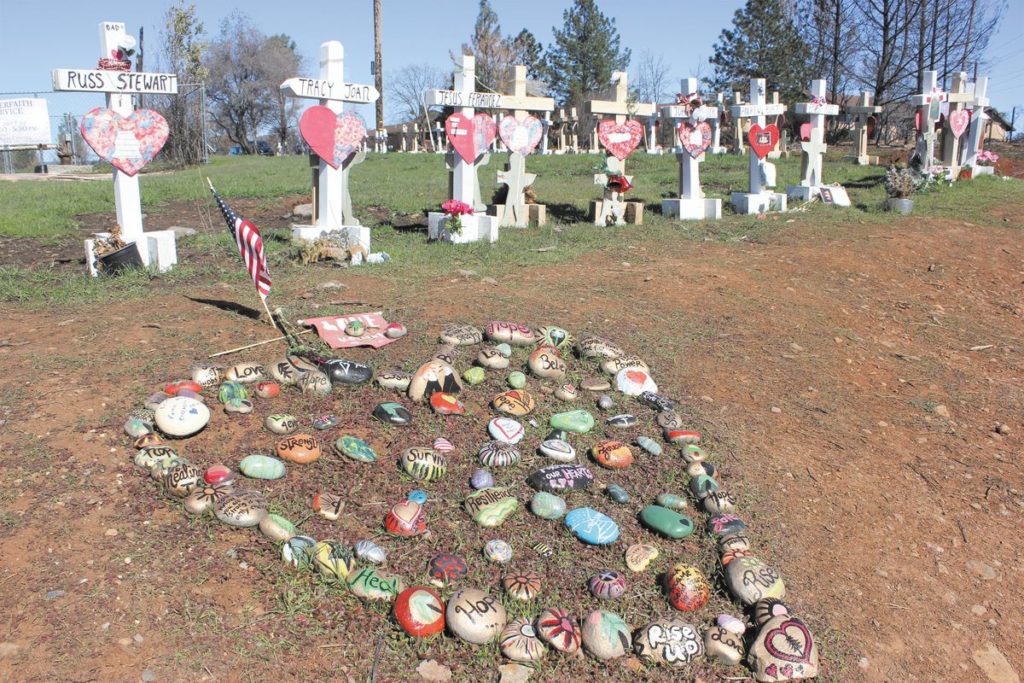
Binstock spent the majority of his time in the courtroom lambasting PG&E, having researched the company’s record of wrongdoing. He listed numerous wildfires, contaminated water tables, and the 2010 gas pipeline explosion in San Bruno that killed eight people, an incident for which PG&E was placed on probation.
“And then the 2018 Camp Fire. They murdered 85 people—84 in the fire and one who committed suicide rather than be burned to death. And at least three elderly citizens who died a few days later because of the stress of being left homeless and penniless,” he said.
“With over 1,500 annual wildfires and the specific disasters I listed, you knew that what you were doing was wrong,” he continued. “And rather than reduce your bonuses, you allowed your failed equipment and your improper inspections to kill people. And that is homicide with malice of forethought. And that is murder.”
Binstock also alluded to how the company, at the time in bankruptcy proceedings, was expected to pay out $25.5 billion in settlements by passing along the costs to ratepayers.
“What’s even more galling is that you will retain your bonuses, and through my PG&E bills I will be paying your bonuses, your fines, your shareholders dividends and your settlements.”
Joseph Downer chided the company along similar lines.
His older brother, 54-year-old Andrew, a wheel-chair bound amputee, perished just outside his home while awaiting first responders.
“Given PG&E’s history, it’s pretty clear that this company won’t change until some PG&E executive actually goes to jail,” he said. “A $3.5 million fine for killing 80 people is not justice. Can you imagine what would happen if an ordinary citizen killed more than 80 people?
“We have a social compact in this society and we give up the right to take matters in our own hands because the court, this court, is supposed to provide justice. I don’t believe justice is served by a
$3.5 million fine. That is less than Mr. Johnson, the person here yesterday telling us how sorry PG&E was, makes in one year.”
Downer said he was disgusted that the utility’s executives use private jets and are paid millions in bonuses at the same time that the company failed to spend $13 to replace the worn equipment that sparked the fire.
As for PG&E’s apology, Downer remained unmollified. He pointed out that one of Johnson’s predecessors, CEO Tony Earley, had expressed similar statements after the explosion in San Bruno. Yet PG&E killed more than 120 people in the last three years alone, he said.
Tom LeBlanc also had harsh words for the utility.
His disabled stepdaughter, 53-year-old Paradise resident Kimber Wehr, perished in the fire. Her death has greatly affected the mental health of her siblings, he told the courtroom, his voice at times booming.
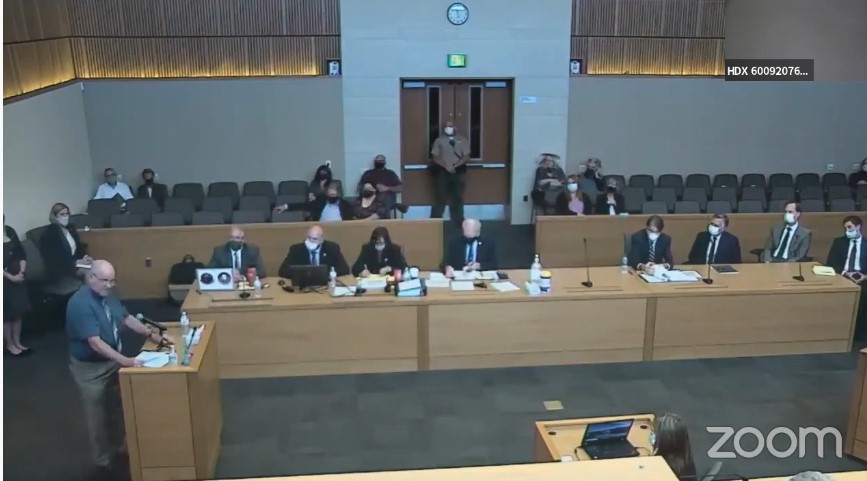
“These people up here on the wall, they had lives,” he said, referring to the photos of victims projected on the wall. “They’re not just statistics. They had names, they were grandmothers, grandfathers, fathers, mothers, sisters, brothers, and in four hours—gone.”
LeBlanc’s wife, Pat, was battling cancer at the time of the blaze, and succumbed to the disease just over a year later. Wehr’s death caused her immeasurable grief, he said.
Describing himself as a retired teacher, coach and administrator, LeBlanc, who lost his home in the blaze and has since left Butte County, said PG&E executives abdicated their responsibility to enforce the rules of safety for the citizens of Paradise.”
“Unfortunately, PG&E was busy putting profits and bonuses first. Safety is the only thing that should have received top priority,” he said. “I leave this courtroom, your honor, as a victim, because I’ve been scarred for life. If they feel just a little bit of pain today from my story, mission accomplished.”
Day of reckoning
In his closing remarks, District Attorney Ramsey noted that there are several days of infamy in history—usually dealing with death and destruction. He pointed to
Dec. 7, 1941, the attack on Pearl Harbor; Nov. 22, 1963, the assassination of President John F. Kennedy; and the Sept. 11, 2001, terror attacks.
“And those days become seared into the collective consciousness of the community,” he said. “These are days that, when you speak of them, they invoke immediate unspeakable, unshakable and unforgettable memories.”
For Butte County, the date is Nov. 8, 2018.
“Over 153,000 acres of destruction. Over 18,800 structures destroyed, of which nearly 14,000 were residents’ family homes, an entire American city wiped from the face of the earth,” Ramsey said. “Untold disruption and displacement of the lives of nearly 50,000 people followed in the wake of that fire. And, of course, the death of those 84 souls that we have seen projected up on that wall as we’ve had these proceedings over that last few days.”
Following the description of the single household in which three women were killed, Ramsey noted that PG&E CEO Johnson was among the company officials, including its outgoing board of directors, forced to listen to the recording of their horrific end.
The order came from U.S. District Judge William Alsup, the judge overseeing PG&E’s criminal probation stemming from the San Bruno explosion. He also ordered the board to tour the blackened landscape of Paradise roughly six months after the wildfire.
In May, Alsup called the utility a “recalcitrant criminal.” And in the Chico courtroom during sentencing proceedings, other choice words by the federal judge were quoted more than once.
Ramsey noted that, under state law and based on the evidence, PG&E’s executives are exempted from serving prison sentences. Moreover, a corporation itself cannot be imprisoned.
“To really demonstrate the consequences of its misbehavior, we can only punish it by penalizing it financially, which quite frankly, under law, is too little for the enormity of the criminal behavior,” he said. “But it is a start. More than anything else today, by the historic nature of PG&E’s pleas to the 84 homicide counts, we establish something that might answer that question. What can we do to make it safe?”
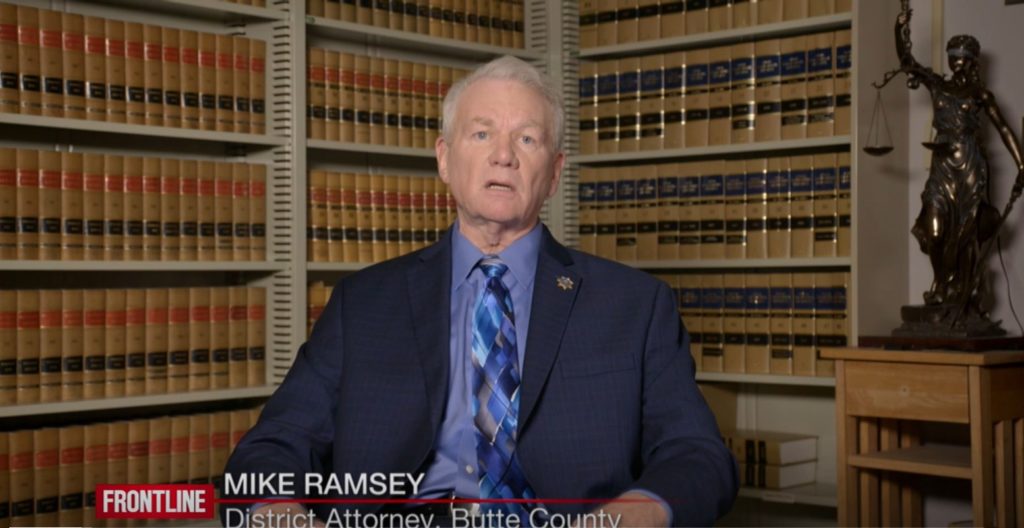
PG&E’s interim CEO, Bill Smith, flanked by attorneys and Aaron Johnson, the utility’s VP of wildfire safety and public engagement, represented the company that day. He said the corporation had heard “every word” spoken by the loved ones of those killed by the wildfire.
“We will never forget their pain. It can never be said too many times: We accept responsibility for our role in the Camp Fire, and all 23,000 employees are committed to making sure our equipment never again causes a catastrophe like this,” Smith said.
“On behalf of everyone at PG&E, I’m truly sorry for the terrible loss of life and the physical and emotional damage resulting from the fire. I recognize that no apology, no plea, no sentencing can undo that damage, and no passage of time can lessen the anguish that we heard expressed in this courtroom.
“All of us know that actions speak louder than words,” he continued. “We have taken action and we will continue to take action to combat the growing threat of wildfires and to keep our customers and communities safe.”
Butte County Superior Court Judge Michael R. Deems echoed Ramsey regarding the exemption for prison time.
“The court has considered the facts of this case, which establish a callous disregard for the safety and property of the citizens of Butte County,” he said. “The court has also considered that the only means of exacting punishment for the many serious crimes to which PG&E has pleaded is to impose a fine. Accordingly, the sentence imposed will be the maximum fines authorized by law.”
But before doing so, ruling that the company pay nearly $3.5 million in fines, fees, assessments and surcharges, plus another $500,000 for the cost of the investigation, Deems quoted Alsup, the federal judge.
“If ever there was a corporation that deserved to go to prison, it’s PG&E.”


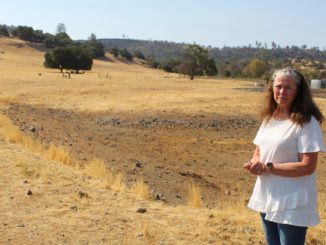

I am certain it was somewhat helpful to the victim’s families to hear the CEO of PG&E say “Guilty” outloud 85 times, but is that really enough? Is the pitiful amount of money they will pay enough? PG&E has put profit over people for decades and it seems to me that they are getting off pretty easy here. My connection to PG&E is through a cousin who used to work for them. In fact he worked for them for 20+ years and took a disability retirement. He was one of the guys who PG&E let work in the high levels of Chromium in Kettleman City — “knowingly.” There was a settlement, but was that even enough? I don’t think so. My cousin suffered from cancer, caused by his job, for many years. He underwent chemo-therapy many times, as the cancer came back again and again over the 20 years that Stanford kept him alive with their treatments. He had a fairly good quality of life during portions of those years, but at what cost? PG&E DID NOT change. After this was exposed they continued to put profits ahead of safety. They gave huge bonuses, all the while neglecting pipelines and electrical structures that resulted in explosions, fires and more fires and deaths. This corporation needs to be disbanded. What makes anyone seriously think they will EVER change. I would rather have seen them taken completely down and for the State of California to make the electrical utility into a Co-op with the customers as owners. That is the ONLY way to insure that safety will be put first. With PG&E continuing to operate look for more of the same.